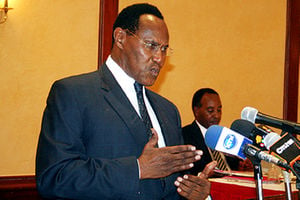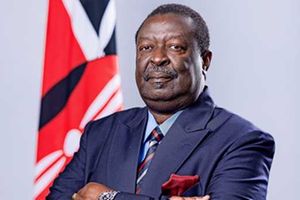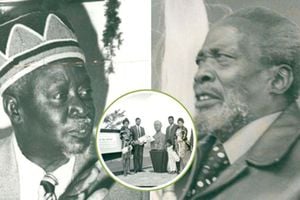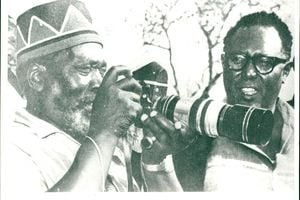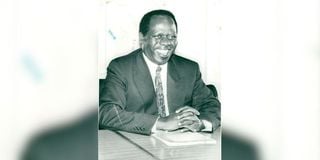
The late Michael Kijana Wamalwa.
Michael Kijana Wamalwa was a man of rare, unparalleled elegance, his every movement imbued with quiet dignity. He had a radiant smile, which seemed less an expression and more a signature, worn like a badge of honour.
It was like a testament to his inner charm. With his mastery of the Queen's English, Wamalwa could both captivate and disarm. He was a playboy. Language was his weapon, and he eloquently wielded it, dazzling and humbling his opponents.
At one moment, he vividly characterised a fellow politician, who had returned to Kanu, as a man “wallowing in the miasma of deceit.” Wamalwa was a political powerhouse and intellectual. Yet, behind closed doors, he found solace in the whimsical chase of Tom & Jerry, indulged in the grandeur of classical music, and honed his intellect through the timeless works of William Shakespeare.

In this picture taken on September 22, 2002, the National Alliance Party’s Big Three Mwai Kibaki (right), Wamalwa Kijana and Charity Ngilu attend the installation of Archbishop Benjamin Nzimbi as the head of the ACK Church at Nairobi’s All Saints Cathedral.
Despite these refined inclinations, Wamalwa was never confined by the trappings of elitism. He was gentle and generous and would walk into a bar with a load of banknotes and leave without any. Those who knew him said he was a connoisseur of the finer things of life, and was unafraid to savor earthly pleasures. Of course, that came at a price. At 58, he passed on at the Royal Free Hospital in London.
Until his ascension to the Vice Presidency in 2002, Wamalwa lived in rented quarters, a curious detail for a man of his stature. He had some challenges with his reputation after a revelation that the deposit payment for his Karen home had been made by a company linked to the notorious swindler, Ketan Somaia. By the time fate claimed him, Wamalwa had not yet cleared the debt, leaving the government to settle the balance.
Like Musalia Mudavadi before him, Wamalwa was heir to a political dynasty, the son of a Senator whose legacy he carried with grace. As a young law lecturer at the University of Nairobi, Wamalwa became legendary, not just for his sharp intellect, but for his love of fine suits, whiskey, fast cars, and beautiful women.
A playboy to some, yes, but beneath the allure and glamour was a man of profound wit. His ambitions were grand, and despite the gilded distractions of life, they propelled him to one of the highest offices in the land. Yet, even as he reached for the stars, his story remained one of complexity, flaws and brilliance intertwined.
Wamalwa was ailing when, on January 3, 2003, President Mwai Kibaki appointed him to the position of vice president. Kibaki was equally ill after a grave motor accident left him with serious injuries and had to be flown to London. It was while visiting Kibaki that Wamalwa fell ill and the two; both graduates of the London School of Economics, ended up in separate London hospitals.
As Kibaki’s VP, Wamalwa was not given a portfolio at first. Some insiders argue that Kibaki wanted his number two to undertake assignments without getting restricted in a single docket. However, after some murmurs from his Western Kenya home turf, Wamalwa was given the role of “national reconstruction” and asked to revive dead, dying, and moribund institutions.

Michael Kijana Wamalwa (centre), with then DP chairman Mwai Kibaki (left), Ford Asili secretary-general Martin Shikuku and other opposition leaders address the media at Parliament Buildings in August 1995.
While Kibaki had great respect for Wamalwa as an intellectual (Wamalwa was also a Cambridge University alumni), he was also aware that the National Rainbow Coalition was a house of cards. Hurriedly assembled in the twilight of the 2002 General Election, it had roped in Kanu rebels, led by Raila Odinga, who had risen in defiance of President Moi’s anointment of Uhuru Kenyatta as his successor. Narc was no love match.
It was a tenuous union, held together by the trembling bonds of fear, self-interest, and political survival. Beneath the surface, however, fissures of discontent spread wide. Odinga’s Liberal Democratic Party wing, feeling betrayed, watched with anger as the National Alliance of Kenya (NAK) tossed aside their Memorandum of Understanding, reneging on the promise to create a Prime Minister’s post for Odinga.
Adding fuel to the fire, the NAK faction, led by Kibaki, Charity Ngilu, and Wamalwa, claimed the lion’s share of Cabinet positions, leaving Odinga’s camp with little but the bitter taste of dashed hopes.
Thus, beneath the veneer of unity, as Wamalwa took office, there was boiling anger. While Odinga had been entrusted with the powerful Ministry of Roads, Works, and Housing, discontent drove the day-to-day agenda. It was in this landscape that Michael Wamalwa was granted the vice-presidency. If Kibaki was not going to create the PM position, it was argued, then the VP should go to LDP, meaning Raila Odinga.
Wamalwa had previous, unfinished wars with Odinga. He had managed to lock him out of the FORD Kenya party. Also, during the height of the FORD Kenya campaign to bring down Kamlesh Pattni and George Saitoti over the Goldenberg scandal, Pattni claimed to have given the party money for a by-election. Gitobu Imanyara, the party's Secretary-General, openly accused Pattni of using his gift as a means to silence Jaramogi on the Goldenberg affair.
As several MPs, including James Orengo, and Peter Anyang' Nyong'o grew increasingly discontent with Odinga’s approach; Wamalwa, alongside his Luhya colleagues, struggled to align with Odinga’s strategy, knowing full well that if key figures like Paul Muite, Imanyara, and Kiraitu Murungi were to leave the party, the chairmanship would fall into their hands. When they left, it was Wamalwa who inherited Jaramogi’s position and finally edged out Raila Odinga.

Ford Kenya chairman Jaramogi Oginga Odinga (center), vice chairman Kijana Wamalwa and secretary general Gitobu Imanyara address the media on October 2, 1992.
Several years later, Wamalwa and Odinga found themselves in the same camp. As the euphoria of NARC’s electoral victory faded and the dust began to settle, the National Rainbow Coalition stood starkly divided. On one side, 50 MPs pledged their allegiance to Odinga’s LDP, while on the other, around 60 gathered under the NAK banner of Kibaki and Wamalwa.
A smaller, enigmatic group of 15 MPs, hailing mostly from the Coast and Rift Valley, stood as the wildcards, refusing to participate in the factional fights. In their hands rested the fragile balance of power.
Kibaki, ever the pragmatist, understood the delicate art of maintaining this political equilibrium. Rather than engage with Odinga’s mastery of rocking the boat, he opted to go for a hands-off policy. The President was still ailing and Wamalwa, his vice-president, was equally in and out of hospital.
As long as Wamalwa was there, Kibaki felt safe. Camps had mushroomed within the government as each tested each other’s might. For Kibaki, governance was a meritocratic ideal. He went for talent and capability and disregarded the tribal and party divisions. But the seeds of discord generated by this intra-party feud would later snowball into the 2007 post-election fracas. The hands-off approach had its downsides.
As scandals began to shake the foundations of the Narc regime, Wamalwa stood apart, perhaps slowed down by the kidney illness challenges. He remained untroubled, calm and married his sweetheart, Yvonne Nabia, in a grand wedding. He died a few months later.
In a political arena where fortunes were brandished like crowns, Wamalwa’s modest estate stood as a quiet ode to a man whose investments were thin by the standards of the political elite: 40 acres of fertile land in Trans Nzoia, a humble five-acre plot in Milimani, Kitale, and just two vehicles; a stately Mercedes Benz 300S and a rugged Range Rover.
Whispers lingered in the corridors of power that he had squandered his wealth. It was said when he chaired a parliamentary accounts committee, the allure of wealth proved too tempting, and the Ford Kenya party, once a bastion of ideals, crumbled under the weight of tenderpreneurs from the Kanu regime, who seduced it with wads of cash.
Under his watch, the vision of Ford Kenya, once vibrant, faded into a shadow of its former self, undone by the same forces Wamalwa had once resisted. In essence, he left behind a legacy marred by missed opportunities and unfulfilled promises.

Kijana Wamalwa is congratulated by James Orengo after he was elected unopposed as the chairman of Ford Kenya at Thika Municipal Stadium.
Born in 1944 in Kitale, Trans Nzoia, Wamalwa's academic journey took him through St. Joseph's Primary School, Chewoyet Secondary School, and eventually to King’s College and Cambridge University, where he earned a Bachelor of Laws degree in 1968.
In 1969, he pursued a Master of Laws at the London School of Economics, before being admitted as a Barrister at Lincoln’s Inn. His political career began in 1979 when he ousted Wafula Wabuge and would go on to win again in 1983 and 1988, establishing himself as a formidable opposition figure during President Moi’s regime.
Wamalwa ran for the presidency and faltered. He was keen to build coalitions. His tenure as Vice President, however, was tragically brief, spanning only from January 3 until his untimely passing on August 23, 2003. It was not enough to gauge his contribution. Kibaki granted him a state funeral as an honour. A man of mixed legacy had left the stage.
Tomorrow: Uncle Moody Awori: The Grand man from Funyula
Read also:

